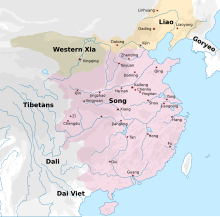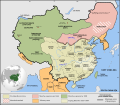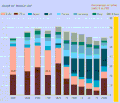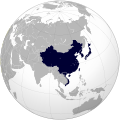Portal:Asia

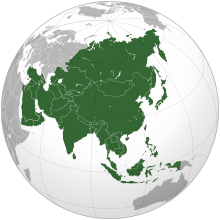 Asia (/ˈeɪʒə/ AY-zhə, UK also /ˈeɪʃə/ AY-shə) is the largest continent in the world by both land area and population. It covers an area of more than 44 million square kilometers, about 30% of Earth's total land area and 8% of Earth's total surface area. The continent, which has long been home to the majority of the human population, was the site of many of the first civilizations. Its 4.7 billion people constitute roughly 60% of the world's population. Asia shares the landmass of Eurasia with Europe, and of Afro-Eurasia with both Europe and Africa. In general terms, it is bounded on the east by the Pacific Ocean, on the south by the Indian Ocean, and on the north by the Arctic Ocean. The border of Asia with Europe is a historical and cultural construct, as there is no clear physical and geographical separation between them. It is somewhat arbitrary and has moved since its first conception in classical antiquity. The division of Eurasia into two continents reflects East–West cultural, linguistic, and ethnic differences, some of which vary on a spectrum rather than with a sharp dividing line. A commonly accepted division places Asia to the east of the Suez Canal separating it from Africa; and to the east of the Turkish Straits, the Ural Mountains and Ural River, and to the south of the Caucasus Mountains and the Caspian and Black seas, separating it from Europe. China and India traded places as the largest economies in the world from 1 to 1800 CE. China was a major economic power for much of recorded history, with the highest GDP per capita until 1500. The Silk Road became the main east–west trading route in the Asian hinterlands while the Straits of Malacca stood as a major sea route. Asia has exhibited economic dynamism as well as robust population growth during the 20th century, but overall population growth has since fallen. Asia was the birthplace of most of the world's mainstream religions including Hinduism, Zoroastrianism, Judaism, Jainism, Buddhism, Confucianism, Taoism, Christianity, Islam, Sikhism, as well as many other religions. (Full article...) Featured articleThe Song dynasty (/sʊŋ/) was an imperial dynasty of China that ruled from 960 to 1279. The dynasty was founded by Emperor Taizu of Song, who usurped the throne of the Later Zhou dynasty and went on to conquer the rest of the Ten Kingdoms, ending the Five Dynasties and Ten Kingdoms period. The Song often came into conflict with the contemporaneous Liao, Western Xia and Jin dynasties in northern China. After retreating to southern China following attacks by the Jin dynasty, the Song was eventually conquered by the Mongol-led Yuan dynasty. The dynasty is divided into two periods: Northern Song and Southern Song. During the Northern Song (Chinese: 北宋; 960–1127), the capital was in the northern city of Bianjing (now Kaifeng) and the dynasty controlled most of what is now Eastern China. The Southern Song (Chinese: 南宋; 1127–1279) refers to the period after the Song lost control of its northern half to the Jurchen-led Jin dynasty in the Jin–Song Wars. At that time, the Song court retreated south of the Yangtze and established its capital at Lin'an (now Hangzhou). Although the Song dynasty had lost control of the traditional Chinese heartlands around the Yellow River, the Southern Song Empire contained a large population and productive agricultural land, sustaining a robust economy. In 1234, the Jin dynasty was conquered by the Mongols, who took control of northern China, maintaining uneasy relations with the Southern Song. Möngke Khan, the fourth Great Khan of the Mongol Empire, died in 1259 while besieging the mountain castle Diaoyucheng, Chongqing. His younger brother Kublai Khan was proclaimed the new Great Khan and in 1271 founded the Yuan dynasty. After two decades of sporadic warfare, Kublai Khan's armies conquered the Song dynasty in 1279 after defeating the Southern Song in the Battle of Yamen, and reunited China under the Yuan dynasty. (Full article...)Selected Country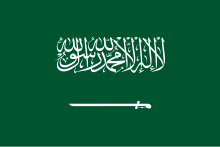 Saudi Arabia, officially the Kingdom of Saudi Arabia (KSA), is a country in West Asia and the Middle East. It covers the bulk of the Arabian Peninsula and has a land area of about 2150000 km2 (830000 sq mi), making it the fifth-largest country in Asia and the largest in the Middle East. It is bordered by the Red Sea to the west; Jordan, Iraq, and Kuwait to the north; the Persian Gulf, Qatar and the United Arab Emirates to the east; Oman to the southeast; and Yemen to the south. Bahrain is an island country off its east coast. The Gulf of Aqaba in the northwest separates Saudi Arabia from Egypt and Israel. Saudi Arabia is the only country with a coastline along both the Red Sea and the Persian Gulf, and most of its terrain consists of arid desert, lowland, steppe, and mountains. The capital and largest city is Riyadh; the kingdom also hosts Islam's two holiest cities of Mecca and Medina. Pre-Islamic Arabia, the territory that constitutes modern-day Saudi Arabia, was the site of several ancient cultures and civilizations; the prehistory of Saudi Arabia shows some of the earliest traces of human activity outside Africa. The world's second-largest religion, Islam, emerged in what is now Saudi Arabia. In the early 7th century, the Islamic prophet Muhammad united the population of the Arabian Peninsula and created a single Islamic religious polity. Following his death in 632, his followers expanded the territory under Muslim rule beyond Arabia, conquering territories in North Africa, Central, South Asia and Iberia in a matter of decades. Arab dynasties originating from modern-day Saudi Arabia founded the Rashidun (632–661), Umayyad (661–750), Abbasid (750–1517), and Fatimid (909–1171) caliphates, as well as numerous other dynasties in Asia, Africa, and Europe. (Full article...)Featured biographyChan Kong-sang SBS MBE PMW (born 7 April 1954), known professionally as Jackie Chan, is a Hong Kong actor, director, writer, producer, martial artist, and stuntman known for his slapstick acrobatic fighting style, comic timing, and innovative stunts, which he typically performs himself. Before entering the film industry, he was one of the Seven Little Fortunes from the China Drama Academy at the Peking Opera School, where he studied acrobatics, martial arts, and acting. Chan has been acting since the 1960s, performing in more than 150 films. He is one of the most influential action film stars of all time. After appearing in many Hong Kong films as a stuntman, Chan's first major breakthrough was the 1978 kung fu action comedy film Snake in the Eagle's Shadow. He then starred in similar kung fu action comedy films such as 1978's Drunken Master and 1980's The Young Master. In 1979, he made his directorial debut with The Fearless Hyena, which was a box office success. 1983's Project A saw the official formation of the Jackie Chan Stunt Team and established Chan's signature style of elaborate, dangerous stunts combined with martial arts and slapstick humor, a style he further developed in a more modern setting with 1984's Wheels on Meals and 1985's Police Story. Rumble in the Bronx (1995), which had a successful worldwide theatrical run, brought Chan into the North American mainstream, leading to a successful Hollywood career with the Rush Hour and Shanghai series. In 2010, Chan appeared in his first dramatic role in an American film, The Karate Kid. (Full article...)General imagesThe following are images from various Asia-related articles on Wikipedia. Featured picture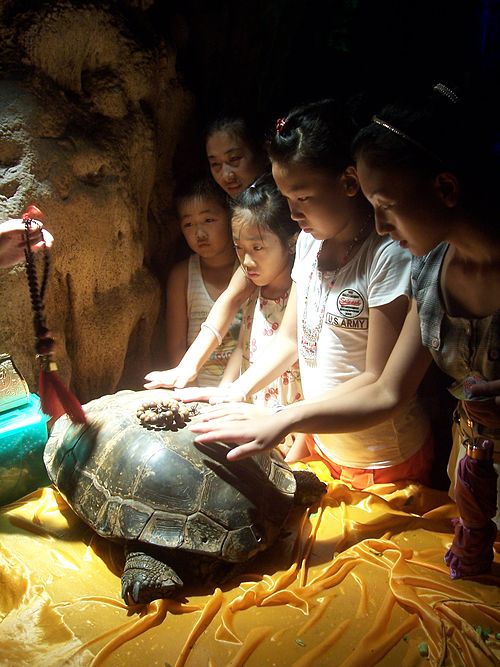 Credit: Paul Munhoven In the grotto of the flute reeds, China, a family shows reverence for an ancient turtle. The turtle is a symbol of longevity throughout many parts of Asia. Its four feet represent the four corners of the earth, its endurance is considered to last 10,000 years. A symbol of good luck and long life, many turtles are pushed towards extinction by consumption in Chinese medicine.
Did you know...
Updated: 6:33, 14 February 2024 In the news
Related portalsMajor Religions in Asia Middle East Central Asia and Surroundings Indian Subcontinent Southeast Asia East Asia Selected panorama
Baalbek is a town in the Beqaa Valley of Lebanon situated east of the Litani River. It is famous for its exquisitely detailed yet monumentally scaled temple ruins of the Roman period, when Baalbek, then known as Heliopolis, was one of the largest sanctuaries in the Empire. TopicsCategoriesAssociated WikimediaThe following Wikimedia Foundation sister projects provide more on this subject:
More portalsShortcuts to this page: Asia portal • P:ASIA Purge server cache |

